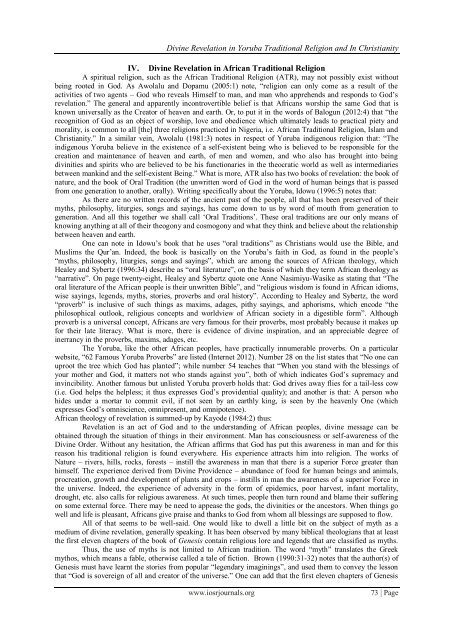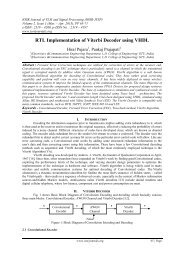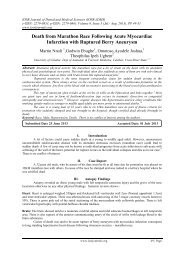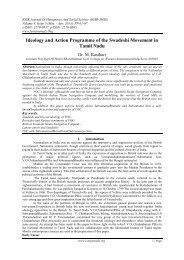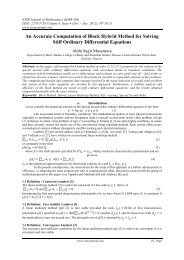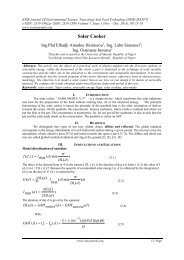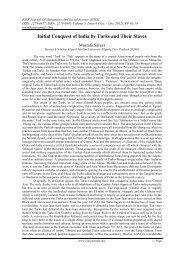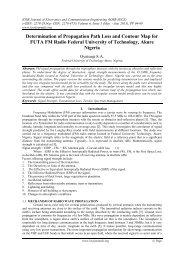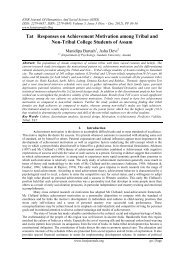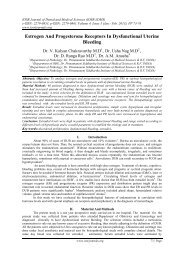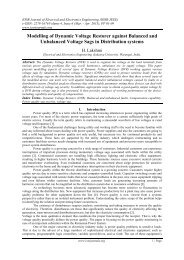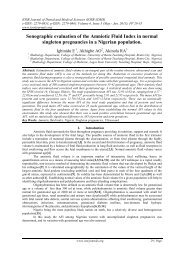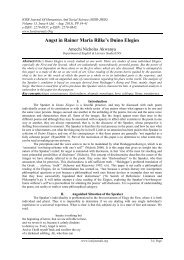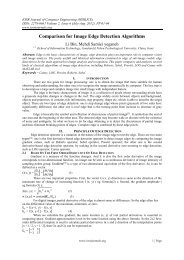Design Compatibility of Classroom Furniture in Urban and ... - IOSR
Design Compatibility of Classroom Furniture in Urban and ... - IOSR
Design Compatibility of Classroom Furniture in Urban and ... - IOSR
You also want an ePaper? Increase the reach of your titles
YUMPU automatically turns print PDFs into web optimized ePapers that Google loves.
Div<strong>in</strong>e Revelation <strong>in</strong> Yoruba Traditional Religion <strong>and</strong> In Christianity<br />
IV. Div<strong>in</strong>e Revelation <strong>in</strong> African Traditional Religion<br />
A spiritual religion, such as the African Traditional Religion (ATR), may not possibly exist without<br />
be<strong>in</strong>g rooted <strong>in</strong> God. As Awolalu <strong>and</strong> Dopamu (2005:1) note, “religion can only come as a result <strong>of</strong> the<br />
activities <strong>of</strong> two agents – God who reveals Himself to man, <strong>and</strong> man who apprehends <strong>and</strong> responds to God‟s<br />
revelation.” The general <strong>and</strong> apparently <strong>in</strong>controvertible belief is that Africans worship the same God that is<br />
known universally as the Creator <strong>of</strong> heaven <strong>and</strong> earth. Or, to put it <strong>in</strong> the words <strong>of</strong> Balogun (2012:4) that “the<br />
recognition <strong>of</strong> God as an object <strong>of</strong> worship, love <strong>and</strong> obedience which ultimately leads to practical piety <strong>and</strong><br />
morality, is common to all [the] three religions practiced <strong>in</strong> Nigeria, i.e. African Traditional Religion, Islam <strong>and</strong><br />
Christianity.” In a similar ve<strong>in</strong>, Awolalu (1981:3) notes <strong>in</strong> respect <strong>of</strong> Yoruba <strong>in</strong>digenous religion that: “The<br />
<strong>in</strong>digenous Yoruba believe <strong>in</strong> the existence <strong>of</strong> a self-existent be<strong>in</strong>g who is believed to be responsible for the<br />
creation <strong>and</strong> ma<strong>in</strong>tenance <strong>of</strong> heaven <strong>and</strong> earth, <strong>of</strong> men <strong>and</strong> women, <strong>and</strong> who also has brought <strong>in</strong>to be<strong>in</strong>g<br />
div<strong>in</strong>ities <strong>and</strong> spirits who are believed to be his functionaries <strong>in</strong> the theocratic world as well as <strong>in</strong>termediaries<br />
between mank<strong>in</strong>d <strong>and</strong> the self-existent Be<strong>in</strong>g.” What is more, ATR also has two books <strong>of</strong> revelation: the book <strong>of</strong><br />
nature, <strong>and</strong> the book <strong>of</strong> Oral Tradition (the unwritten word <strong>of</strong> God <strong>in</strong> the word <strong>of</strong> human be<strong>in</strong>gs that is passed<br />
from one generation to another, orally). Writ<strong>in</strong>g specifically about the Yoruba, Idowu (1996:5) notes that:<br />
As there are no written records <strong>of</strong> the ancient past <strong>of</strong> the people, all that has been preserved <strong>of</strong> their<br />
myths, philosophy, liturgies, songs <strong>and</strong> say<strong>in</strong>gs, has come down to us by word <strong>of</strong> mouth from generation to<br />
generation. And all this together we shall call „Oral Traditions‟. These oral traditions are our only means <strong>of</strong><br />
know<strong>in</strong>g anyth<strong>in</strong>g at all <strong>of</strong> their theogony <strong>and</strong> cosmogony <strong>and</strong> what they th<strong>in</strong>k <strong>and</strong> believe about the relationship<br />
between heaven <strong>and</strong> earth.<br />
One can note <strong>in</strong> Idowu‟s book that he uses “oral traditions” as Christians would use the Bible, <strong>and</strong><br />
Muslims the Qur‟an. Indeed, the book is basically on the Yoruba‟s faith <strong>in</strong> God, as found <strong>in</strong> the people‟s<br />
“myths, philosophy, liturgies, songs <strong>and</strong> say<strong>in</strong>gs”, which are among the sources <strong>of</strong> African theology, which<br />
Healey <strong>and</strong> Sybertz (1996:34) describe as “oral literature”, on the basis <strong>of</strong> which they term African theology as<br />
“narrative”. On page twenty-eight, Healey <strong>and</strong> Sybertz quote one Anne Nasimiyu-Wasike as stat<strong>in</strong>g that “The<br />
oral literature <strong>of</strong> the African people is their unwritten Bible”, <strong>and</strong> “religious wisdom is found <strong>in</strong> African idioms,<br />
wise say<strong>in</strong>gs, legends, myths, stories, proverbs <strong>and</strong> oral history”. Accord<strong>in</strong>g to Healey <strong>and</strong> Sybertz, the word<br />
“proverb” is <strong>in</strong>clusive <strong>of</strong> such th<strong>in</strong>gs as maxims, adages, pithy say<strong>in</strong>gs, <strong>and</strong> aphorisms, which encode “the<br />
philosophical outlook, religious concepts <strong>and</strong> worldview <strong>of</strong> African society <strong>in</strong> a digestible form”. Although<br />
proverb is a universal concept, Africans are very famous for their proverbs, most probably because it makes up<br />
for their late literacy. What is more, there is evidence <strong>of</strong> div<strong>in</strong>e <strong>in</strong>spiration, <strong>and</strong> an appreciable degree <strong>of</strong><br />
<strong>in</strong>errancy <strong>in</strong> the proverbs, maxims, adages, etc.<br />
The Yoruba, like the other African peoples, have practically <strong>in</strong>numerable proverbs. On a particular<br />
website, “62 Famous Yoruba Proverbs” are listed (Internet 2012). Number 28 on the list states that “No one can<br />
uproot the tree which God has planted”; while number 54 teaches that “When you st<strong>and</strong> with the bless<strong>in</strong>gs <strong>of</strong><br />
your mother <strong>and</strong> God, it matters not who st<strong>and</strong>s aga<strong>in</strong>st you”, both <strong>of</strong> which <strong>in</strong>dicates God‟s supremacy <strong>and</strong><br />
<strong>in</strong>v<strong>in</strong>cibility. Another famous but unlisted Yoruba proverb holds that: God drives away flies for a tail-less cow<br />
(i.e. God helps the helpless; it thus expresses God‟s providential quality); <strong>and</strong> another is that: A person who<br />
hides under a mortar to commit evil, if not seen by an earthly k<strong>in</strong>g, is seen by the heavenly One (which<br />
expresses God‟s omniscience, omnipresent, <strong>and</strong> omnipotence).<br />
African theology <strong>of</strong> revelation is summed-up by Kayode (1984:2) thus:<br />
Revelation is an act <strong>of</strong> God <strong>and</strong> to the underst<strong>and</strong><strong>in</strong>g <strong>of</strong> African peoples, div<strong>in</strong>e message can be<br />
obta<strong>in</strong>ed through the situation <strong>of</strong> th<strong>in</strong>gs <strong>in</strong> their environment. Man has consciousness or self-awareness <strong>of</strong> the<br />
Div<strong>in</strong>e Order. Without any hesitation, the African affirms that God has put this awareness <strong>in</strong> man <strong>and</strong> for this<br />
reason his traditional religion is found everywhere. His experience attracts him <strong>in</strong>to religion. The works <strong>of</strong><br />
Nature – rivers, hills, rocks, forests – <strong>in</strong>still the awareness <strong>in</strong> man that there is a superior Force greater than<br />
himself. The experience derived from Div<strong>in</strong>e Providence – abundance <strong>of</strong> food for human be<strong>in</strong>gs <strong>and</strong> animals,<br />
procreation, growth <strong>and</strong> development <strong>of</strong> plants <strong>and</strong> crops – <strong>in</strong>stills <strong>in</strong> man the awareness <strong>of</strong> a superior Force <strong>in</strong><br />
the universe. Indeed, the experience <strong>of</strong> adversity <strong>in</strong> the form <strong>of</strong> epidemics, poor harvest, <strong>in</strong>fant mortality,<br />
drought, etc. also calls for religious awareness. At such times, people then turn round <strong>and</strong> blame their suffer<strong>in</strong>g<br />
on some external force. There may be need to appease the gods, the div<strong>in</strong>ities or the ancestors. When th<strong>in</strong>gs go<br />
well <strong>and</strong> life is pleasant, Africans give praise <strong>and</strong> thanks to God from whom all bless<strong>in</strong>gs are supposed to flow.<br />
All <strong>of</strong> that seems to be well-said. One would like to dwell a little bit on the subject <strong>of</strong> myth as a<br />
medium <strong>of</strong> div<strong>in</strong>e revelation, generally speak<strong>in</strong>g. It has been observed by many biblical theologians that at least<br />
the first eleven chapters <strong>of</strong> the book <strong>of</strong> Genesis conta<strong>in</strong> religious lore <strong>and</strong> legends that are classified as myths.<br />
Thus, the use <strong>of</strong> myths is not limited to African tradition. The word “myth” translates the Greek<br />
mythos, which means a fable, otherwise called a tale <strong>of</strong> fiction. Brown (1990:31-32) notes that the author(s) <strong>of</strong><br />
Genesis must have learnt the stories from popular “legendary imag<strong>in</strong><strong>in</strong>gs”, <strong>and</strong> used them to convey the lesson<br />
that “God is sovereign <strong>of</strong> all <strong>and</strong> creator <strong>of</strong> the universe.” One can add that the first eleven chapters <strong>of</strong> Genesis<br />
www.iosrjournals.org<br />
73 | Page


